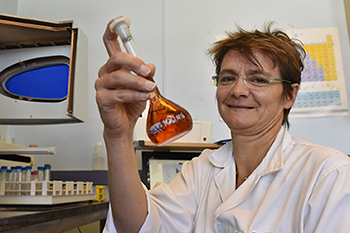Latest News Archive
Please select Category, Year, and then Month to display items
21 July 2021
|
Story Rulanzen Martin
|
Photo Charl Devenish
 Even after her premiership, Helen Zille has remained a powerful force within the South African political landscape. Here she is pictured during a workshop hosted by the Department of Political Science and Governance in February 2020.
Even after her premiership, Helen Zille has remained a powerful force within the South African political landscape. Here she is pictured during a workshop hosted by the Department of Political Science and Governance in February 2020.
Zille will be talking to
Prof Hussein Solomon in the Department of Political Studies and Governance at the University of the Free State.
You can join this interesting discussion on:
Date: 29 July 2021
About the author:
Helen Zille is a South African journalist, activist, and politician who served as the national leader (2007-2015) of the Democratic Alliance (DA), the official opposition party in South Africa. She was also Premier of the Western Cape from 2009 until 2019. Zille’s autobiography, Not without a Fight, was published in 2016.
UFS Ground Studies Laboratory receives accreditation to international standard
2016-03-18

Lore-Mari Deysel, Deputy-Director of the institute for Groundwater Studies.
Photo: Charl Devenish |
The Institute for Groundwater Studies (IGS) Laboratory at the University of the Free State is on equal footing with international testing labs. With its accreditation in March 2016 by SANAS (South African National Accreditation System), the IGS Laboratory now officially meets global standards.
Quality of water
The IGS Laboratory mainly analyses the quality of water samples. When it was originally established in 1989, the lab’s central function was to conduct testing for researchers at the institute itself. “After the public and water boards realised their need to analyse water samples, the IGS Laboratory expanded to deliver a service to these clients,” says Lore-Mari Deysel, Deputy-Director of the institute.
Since suppliers and regulatory authorities will not accept test or calibration results from a lab that is not accredited, the IGS initiated the accreditation process.
Accreditation to international standard
In order to be deemed technically competent and able to receive accreditation, labs must meet the ISO/IEC 17025 standard. ISO/IEC 17025 was first issued in 1999 by the ISO (International Organization for Standardization) and the IEC (International Electrotechnical Commission).According to Deysel, this is the single most important standard for calibration and testing laboratories around the world.
“Laboratories that are accredited to this international standard have demonstrated that they are technically competent and able to produce precise and accurate test and/or calibration data. Furthermore, it demonstrates that the university has the capacity to supply valuable and reliable services alongside the academy,” Deysel says.